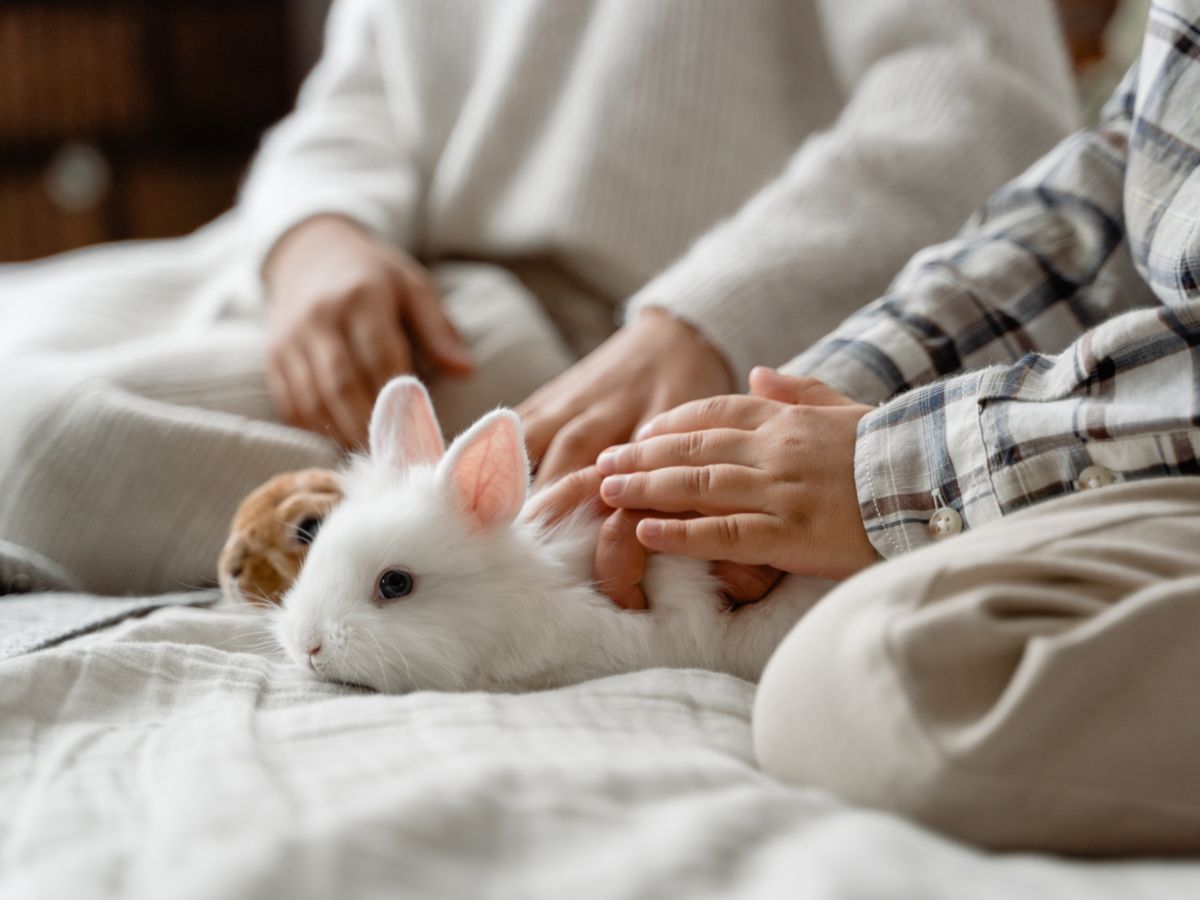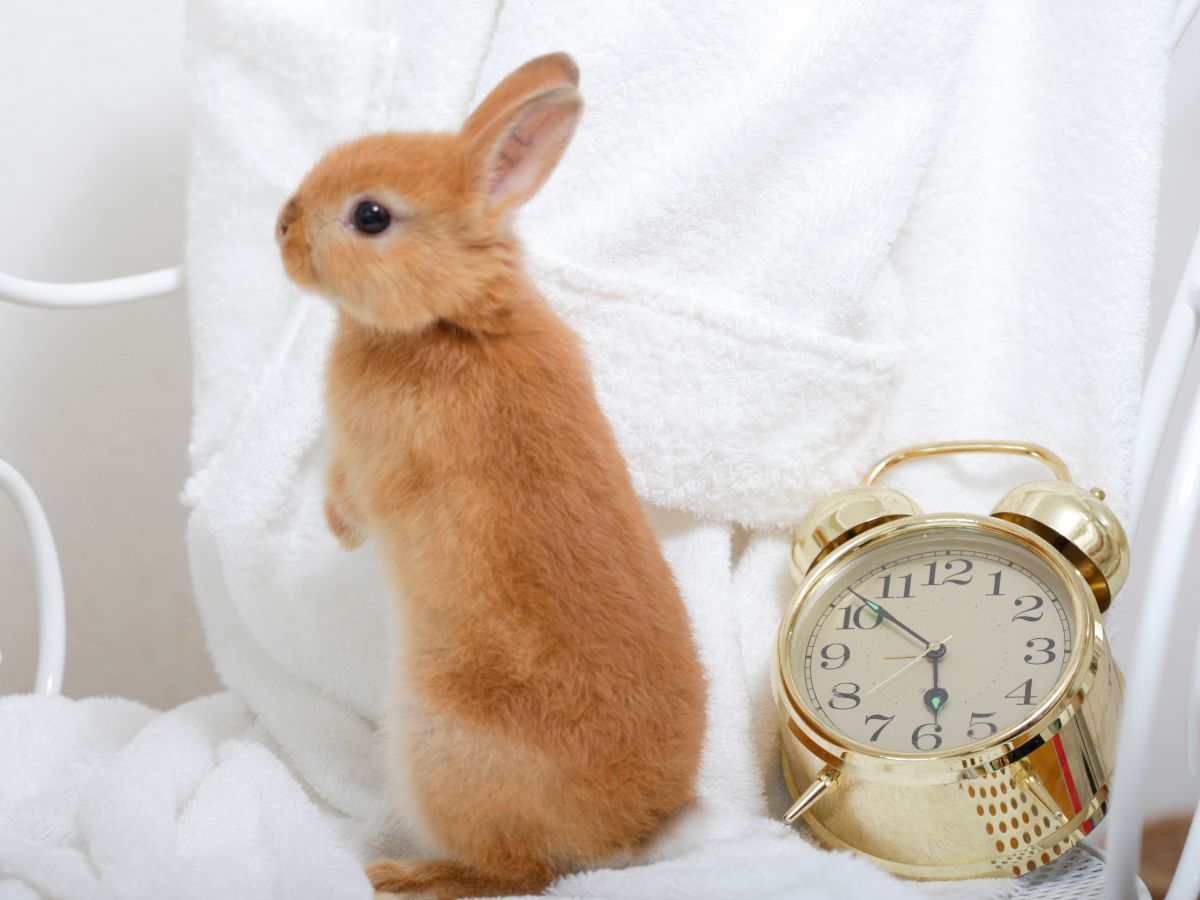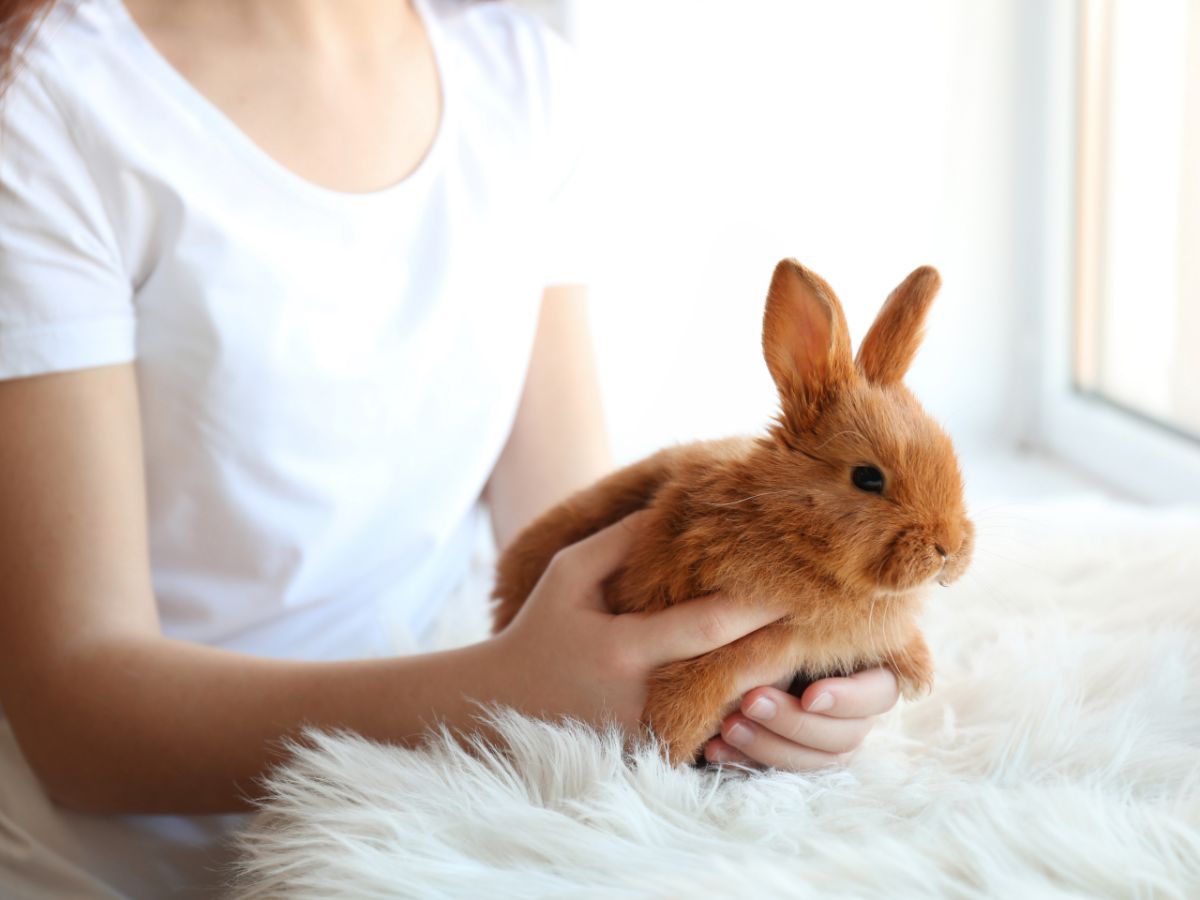Juggling work, social activities, and personal time is hard; if you include a rabbit in the mix, finding a work-life balance becomes even harder. If you spend a considerable amount of time each day at work, school, or college, you won’t have much free time at home to spend with your rabbit. You may wonder, how much time should you spend with your rabbit?
Bonded free-roaming rabbits require between one to two hours of attention daily, while you will need to spend about four hours with a rabbit that lives in a hutch and significantly more time with a single rabbit. Rabbits can become aggressive or depressed without adequate attention.
Many people decide to get a rabbit instead of a dog, thinking they require less attention and work. However, this can’t be further from the truth! Rabbits need the same attention as dogs, if not more.
Contents
How Much Attention Does Your Rabbit Need?
Rabbits thrive on social interaction. As social creatures, rabbits enjoy the company of their humans as much as their rabbit friends. In the wild, rabbits live in large groups and form lifelong bonds with their chosen companions.
Due to rabbits’ social nature, limited interaction with other animals or humans can harm them psychologically and health-wise.
A lack of attention can lead to:
- Loneliness and depression
- Aggression
- Anti-social behavior (skittishness, avoiding contact)
- Boredom
- Stress
Rabbits lead complex emotional lives, and their emotions impact their health. It has been reported that rabbits can die from depression, while stressed rabbits often lose their fur.
In contrast, spending time with other rabbits or humans enriches their lives and have many positive effects for both rabbit and human, such as:
- Spending time with rabbits can lower depression and improve your overall mood
- Rabbits that spend time with humans are easier to groom, handle, and train
- You strengthen the bond with your rabbit when you spend quality time together
- Social interaction makes your rabbit happier, which improves their overall health
- Rabbits’ playful nature and cuddly little bodies help to alleviate anxiety in humans
Unless you have a special-needs rabbit or can spend most of your time at home, say, for instance, you are retired or working from home, it is recommended to have at least two rabbits. Bonded rabbits have the companionship of each other, so they do not need as much attention from humans as single rabbits do.
Spending between one to two hours a day with a free-roaming bonded pair is sufficient to give them enough exercise and affection and establish and maintain a bond. If you really lack time, you should spend at least one hour with them daily.
The time you spend with your rabbits each day can be divided throughout the day, provided the time brackets are not too short, and they have your full attention for that time. Twenty-minute segments three times a day are ideal. You can also do ten minutes segments spread out during the day, but less than ten minutes is too short.
Rabbits that are caged up in hutches will require more of your attention. Caged rabbits need exercise and attention, so aim to give them at least four hours out of their cage everyday. Two hours before work and two in the evenings are the best.
Lastly, single rabbits require the most attention. Rabbits are not happy alone, and with no bunny companion, single rabbits rely solely on their owners to fulfill their social needs. Bonded rabbits rarely leave each other’s sides and spend lots of time playing and grooming each other. If you have a single rabbit, you should spend at least eight hours with them.
Free roaming a single rabbit will make it significantly easier to spend time with them, as it will make them feel like a part of the family, and having you in the same room, even if you are not giving them attention, will make them feel less alone.
Whether your rabbit is a single rabbit, part of a bonded pair, or spends most of their time in a hutch, never force your rabbit to spend time with you; attention and playtime should happen on your bunny’s terms.
If your rabbit is still young or shy, forcing them to play with you can stress them out and harm your bond. Instead, spend some time on the floor on their level and allow them to reach out to you. Until your rabbit trusts you, simply laying on the floor close to them counts as spending time with them.
4 Ways To Bond And Play With Your Rabbit
There are many ways to spend time with your rabbit. While younger rabbits are more energetic and playful, rabbits of all ages are curious and enjoy mental stimulation.
1. Create An Obstacle Course For Your Rabbit
Rabbits love exploring! Creating an obstacle course for them will give you hours of fun time and doesn’t have to cost anything.
You can use packaging boxes and empty toilet rolls to make castles, bridges, tunnels, and other obstacles for your bunny to crawl and climb on. Sprinkle hay or pellets around the obstacle course or entice them with a few treats hidden somewhere along the course.
Sit back and be entertained!
2. Rabbits Love Stacking Cups
Stacking cups used for toddlers are just as fascinating to rabbits. Rabbits enjoy unstacking the cups with their teeth and are extra motivated if you place pellets between the cups.
Letting your rabbit play with stacking cups is best for morning playtime when they have the whole day to work off the energy from the treats.
3. Toys For Your Rabbit
There are so many toys for rabbits! Choose chew toys made from natural materials like pine or willow wood, seagrass, or sisal. To prevent your rabbit from becoming bored of their toys, only give him a few at a time and switch them up weekly. Chew toys will also keep them entertained when you are busy.
Toss toys are ideal for rabbit-human playtime. You can teach your bunny to play fetch with the toss toys with some patience and regular practice.

4. Combine Downtime With Cuddle Time
Believe it or not, many bunnies enjoy watching TV, or perhaps it appears they are watching. Either way, they enjoy spending time in front of the TV with their humans. You are more relaxed when you watch TV in the evenings, and your bunny likely picks up on your mood.
Combining your relaxation with cuddle time gives you the best of both worlds. Pet your rabbit while watching TV or reading a book.
When Is The Best Time To Play With Your Rabbit?
Rabbits are most energetic during the twilight hours of the day when their eyesight is best. You may think they are nocturnal, but they are, in fact, crepuscular! Early mornings are their most active time, so it is best for outdoor exercise, active playtime, and obstacle courses.
Evenings at dusk are their second active time, but once the sun sets, they prefer less active attention like cuddles and petting.
How To Spot Boredom In Your Rabbit
Bored rabbits have different ways of coping with their boredom. Some will become destructive and chew on things they shouldn’t be chewing on, like your furniture. Others may pass the time by eating or sleeping. Rabbits may also become lethargic and uninterested in cuddles.
Boredom can have serious consequences on your rabbit’s health, so make sure you spend quality time with them each day to prevent it, and if you can, add another rabbit to your household to keep them company.
Conclusion
Rabbits are active and social animals and should not be considered pets if you have minimum time to spend with them. Contrary to popular belief, they require the same amount of attention you would give a dog. Rabbits that are not part of a bonded pair will require even more of your time.
Free-roaming your rabbit and combining personal low-energy activities with cuddle time can reduce the time you spend actively engaging with your rabbit if you have limited time.




